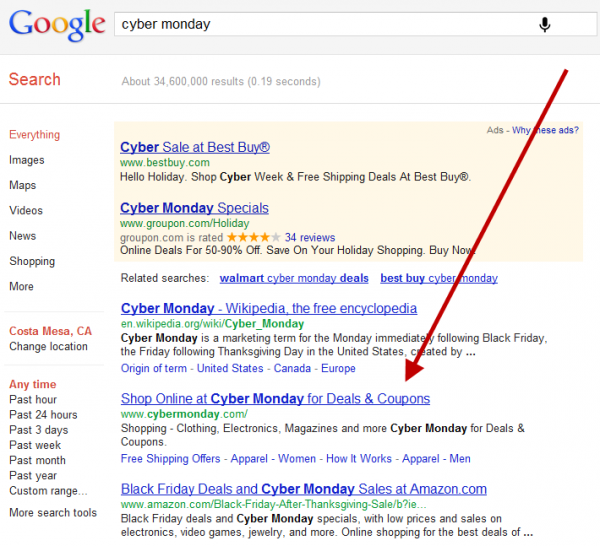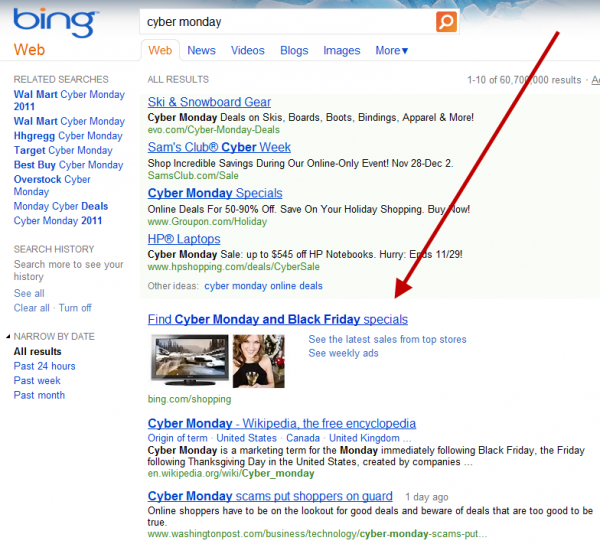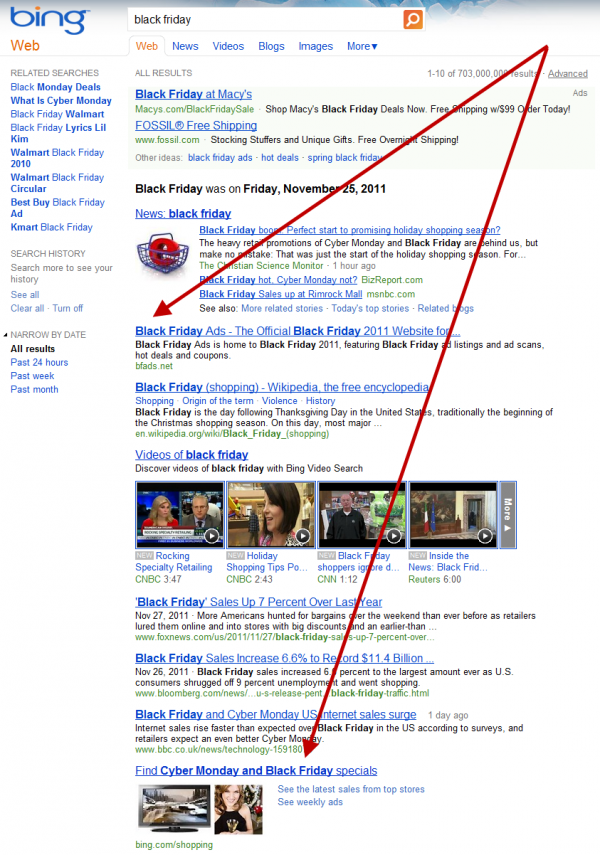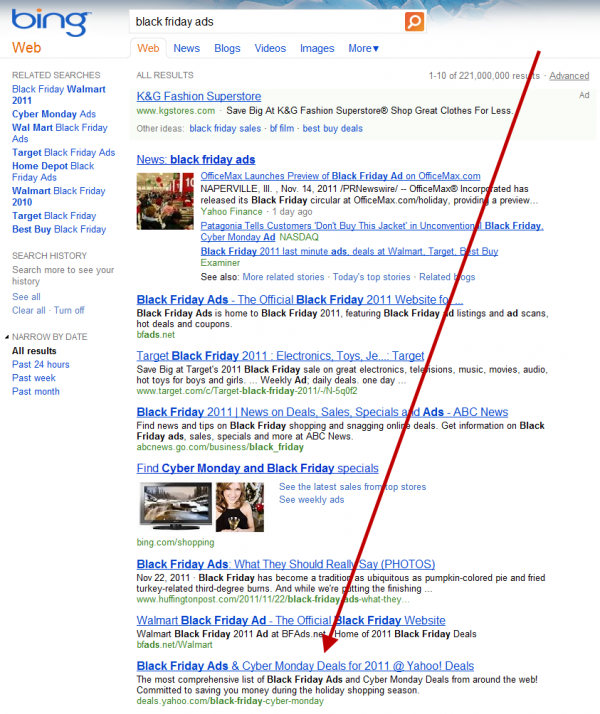Bing Bans Holiday Deals Sites, Including One By Group That Created Cyber Monday
Ironically, the trade group that created the Cyber Monday concept had its own CyberMonday.com site lost in cyberspace this week. Lost, that is, if you tried to use Bing to find it. The site, along with some Black Friday deals sites, have been deliberately dropped from Bing as being too “thin” in content. Bing’s Version […]
Ironically, the trade group that created the Cyber Monday concept had its own CyberMonday.com site lost in cyberspace this week. Lost, that is, if you tried to use Bing to find it. The site, along with some Black Friday deals sites, have been deliberately dropped from Bing as being too “thin” in content.
Bing’s Version Of The Google Panda Update
If “thin is bad” sounds familiar, that’s because Google kicked off this trend earlier this year. The Google Panda Update was a change in how Google ranked web pages, designed to penalize pages deemed to be content-light.
Google’s change didn’t remove web pages. It just meant that pages deemed thin had less chance of ranking well.
In contrast, Bing’s change is more dramatic. It has completely removed some sites deemed thin from its search engine.
CyberMonday.com: Loved By Google, Banned By Bing
Consider the case of CyberMonday.com. The site is run by Shop.org, the digital division of the National Retail Federation. Microsoft — which owns Bing — is one of the Shop.org member companies, along with many other major brands.
Shop.org coined the term Cyber Monday in November 2005, as even covered by BusinessWeek by then. The following year, Shop.org created the CyberMonday.com web site to go along with the campaign.
On Google, CyberMonday.com currently ranks in the top results for a search on cyber monday:
On Bing, it doesn’t rank in the top results. Noteworthy, Bing’s own special page to promote Black Friday and Cyber Monday deals available through Bing Shopping gets top billing:
Bing Kills Thin Sites, Doesn’t Just Bury Them
CyberMonday.com doesn’t rank because it has no pages listed within Bing at all:
CyberMonday.com isn’t the only site impacted this way. A number of Black Friday-oriented sites have also gone missing, including:
- blackfriday.info
- theblackfriday.com
- black-friday.net
- 2011blackfridayads.com
- blackfriday.com
- blackfriday2011.com
Bing: Dropping Thin Sites Isn’t New
Why were they dropped? Bing told me:
One of our main goals at Bing is to deliver quality results for our users. Consistent with our guidance to site owners, websites that seem to rely mostly on affiliate content or that offer only thin content often don’t deliver the value searchers are looking for and may be demoted or removed from our index. This is something we continually refine and look at closely throughout the year.
Is this new? Does it impact more than Black Friday and Cyber Monday sites? I was told:
It’s nothing new, and follows guidance we’ve given on our webmaster site. We don’t have any specifics to share.
But It Sure Feels New
Despite what Bing says, this sure feels new. Bing’s statement says this is all consistent with its guidelines, with the link it emailed as part of that statement supposedly pointing to that guidance. But I found nothing there that gave the impression this was a long-standing policy.
The link leads to the Bing Webmaster Center blog, not to its publisher guidelines. Going through the posts myself, looking for any news that thin content gets you banned, the best I could find was this post in August that said:
The worst approach leaves you to seem “thin” in your approach. This essentially means you aren’t really providing content of value. An example of this would be a website aggregating content from multiple sources on one page. Such an approach amounts to little more than a links page related to the query entered.
Thin’s not good, clearly, but that article doesn’t say that thin pages will be banned.
Heading over to actual publisher guidance area, the Guidelines For Successful Indexing doesn’t list thin content as a reason a site might be removed from Bing. Neither does the page about requesting reinclusion.
Instead, I had to go over to another section at Bing designed for searchers — not for publishers — to find this definition of spam that seems to include thin pages as something that might be removed:
Some pages captured in our index turn out to be pages of little or no value to users and may also have characteristics that artificially manipulate the way search and advertising systems work in order to distort their relevance relative to pages that offer more relevant information. Some of these pages include only advertisements and/or links to other websites that contain mostly ads, and no or only superficial content relevant to the subject of the search. To improve the search experience for consumers and deliver more relevant content, we might remove such pages from the index altogether, or adjust our algorithms to prioritize more useful and relevant pages in result sets.
I’m not sure how long this has been there; it’s certainly not in an area publishers would easily spot. It doesn’t seem to guarantee that sites that are thin will be completely blown out of Bing, in the way that these sites have been.
And Feels Targeted To Holiday Deal Sites
Despite what Bing says, this change does seem new — and specifically aimed at sites featuring holiday shopping deal offers.
The person who tipped us to these missing sites last week certainly thought this was a recent change (with the Thanksgiving break, it took until now to get a statement back from Bing).
Over at WebmasterWorld, Rob Woods noted the same in a discussion:
Bing just nuked all but one of the top black friday ad sites from the index. Not just penalized but completely removed all the top ranking domains entirely (except one).
Bing also just nuked any site with “Cyber Monday” in the URL including the .com which is the official site of the National Retail Federation which created Cyber Monday in the first place. Having launched their own black friday / cyber monday affiliate site it looks like they are trying to eliminate any competition from the SERPs. Virtually any site with either keyword in the domain has been completely removed from Bing’s index.
And Is The Opposite Of What Bing Said About Panda
Another oddity is that earlier this year, when asked about Google’s Panda effort, Bing suggested that it wasn’t relevant for Google to be applying sitewide penalties. In an interview with Eric Enge, Bing Director Stefan Weitz said:
Google’s Panda Update was an interesting event. I saw reports recently on DemandMedia showing they were down 40% on their traffic. What this speaks to is the necessity to look at page level quality. I think one of the things that started the work on Panda was the JC Penney paid link issue which called into question the quality of PageRank.
Google initially responded by blocking the entire JC Penney domain for a few days. We thought that hurt the users because we did the same thing in a test. We blocked all JC Penney internally and asked our human ranking systems “does this result for the search phrase “comforters” look better or worse after this change?” Everyone said it looked worse because they expected to see JC Penney there.
What it told us was there are different ways to classify quality of pages. We have page level classifiers that look at every page we index that attempt to discern a quality score. It looks at things like reading levels, number of ads versus content, length of words, length of page, all those standard things, and some not so standard things as well.
In short, Bing believes it’s important that each page be individually assessed for its relevancy and further says it has the technology to do this. However, in the case of these sites, none of this is happening. They were just completely wiped out.
Are These Sites That Bad?
Of course, I’m not suggesting that Bing should keep crappy sites in its search engine. It’s just pretty strange to discover that the site run by the group that started the whole Cyber Monday idea was among those to get the axe, a group supported by Microsoft itself, a site that includes the Microsoft Store among the listings.
Sure, the Blekko search engine that’s been campaigning against thin content doesn’t list any pages from it, either. But Google — which also has guidelines against thin content — deems it worthy of a top ranking.
Similarly, these three sites are all deemed good enough the top results for black friday on Google:
The same sites are completely banned by Bing. They have no pages at all listed, and so they certainly don’t rank for black friday:
Those two arrows? One points to the aforementioned page run by Bing itself offering Cyber Monday and Black Friday specials through Bing Shopping.
The other one, higher up, highlights how BFAds.net managed to survive the culling, even though I’m hard pressed to see the difference between this post on that site versus what Cyber Monday’s home page offered.
Can you spot the difference?
BFAds.net is on the left; CyberMonday.com is on the right.
Thin Is Bad; Thinner Than Thin For Yahoo Is OK?
In another inconsistency, consider this search for black friday ads at Bing:
The arrow points to a page at Yahoo Deals with Black Friday ads:
See those ads that the arrow points to? Those come from BlackFriday2011.com. Click on any of them, and you go to a page at that site — which itself is banned by Bing.
Now that’s irony. BlackFriday2011.com is deemed to thin for Bing, but a page that points to all that thin content? That’s apparently thick enough to keep.
Blowback On The Antitrust Front
Google is one company that will getting a nice holiday bump from the removals. Google has been under fire that it manipulates its results to promoting its own content and keep competitors out.
Microsoft has been one of the companies funding efforts to fight Google on this front, such as through FairSearch. But now, Bing appears to be doing exactly what Google’s accused of. Sites have been dropped that potentially compete with the special Bing Shopping page that’s ranking well.
Like Google, Bing has a dedicated shopping search engine. Like Google, searchers are automatically suggested to use this for relevant queries, such as this unit that’s inserted into a search for digital cameras, showing shopping results:
In contrast, this unit for the special Bing holiday shopping page isn’t showing shopping results:
Instead, it’s designed to drive people to a particular page in the shopping area. It also carries a special tracking code. Both things are unusual, red flags that this is something being done to promote Bing above and beyond what its regular relevancy algorithms would do.
As for the removals, Foundem — another member of FairSearch — has lead the charges that it and others have been banned from Google not for quality issues but instead for anti-competitive reasons.
Google’s Panda Update, Foundem recently argued in a white paper (PDF), was just a continuation of this process:
Panda marks a significant escalation in Google’s undeclared war on its vertical-search rivals. So far, few have made a connection between Panda and the various antitrust Investigations into Google. But Panda isn’t just relevant to these investigations; it is central to them. Despite being widely touted as an attack on content-farms—which are almost the polar opposite of vertical search services—Panda also marks an aggressive escalation of Google’s vertical-search targeted, “lack of original content” penalties….
With Panda, Google is now targeting many established vertical search brands, as well as emerging ones. Still mindful that it cannot openly penalise well-known competitors, Panda’s algorithmic demotions are more subtle than their predecessors: although affected sites do not completely disappear from Google’s search results, they are systematically demoted to a point beyond the reach of most users, and so receive little or no traffic from this vital channel.
If Google’s Panda Update is bad for merely demoting sites for lacking original content, it’s hard to see how Bing completely removing sites for exactly the same reason is going to help those arguing this aspect of the antitrust investigations against Google.
Postscript: I’m waiting to hear back from Shop.org. They’re checking on the situation, having heard about it only today, apparently after this article appeared. My guess is that they didn’t even notice they were dropped from Bing, probably because Google sends so much traffic to them that not being in Bing didn’t register.
Postscript 2: See our follow-up post at Marketing Land, Holiday Deals Sites Confirm: Bing Dropped Them Just Before Black Friday & Cyber Monday.
Postscript 3: See our further follow-up story, Banned Holiday Deal Sites Return To Bing.
Contributing authors are invited to create content for Search Engine Land and are chosen for their expertise and contribution to the search community. Our contributors work under the oversight of the editorial staff and contributions are checked for quality and relevance to our readers. The opinions they express are their own.
Related stories
New on Search Engine Land









